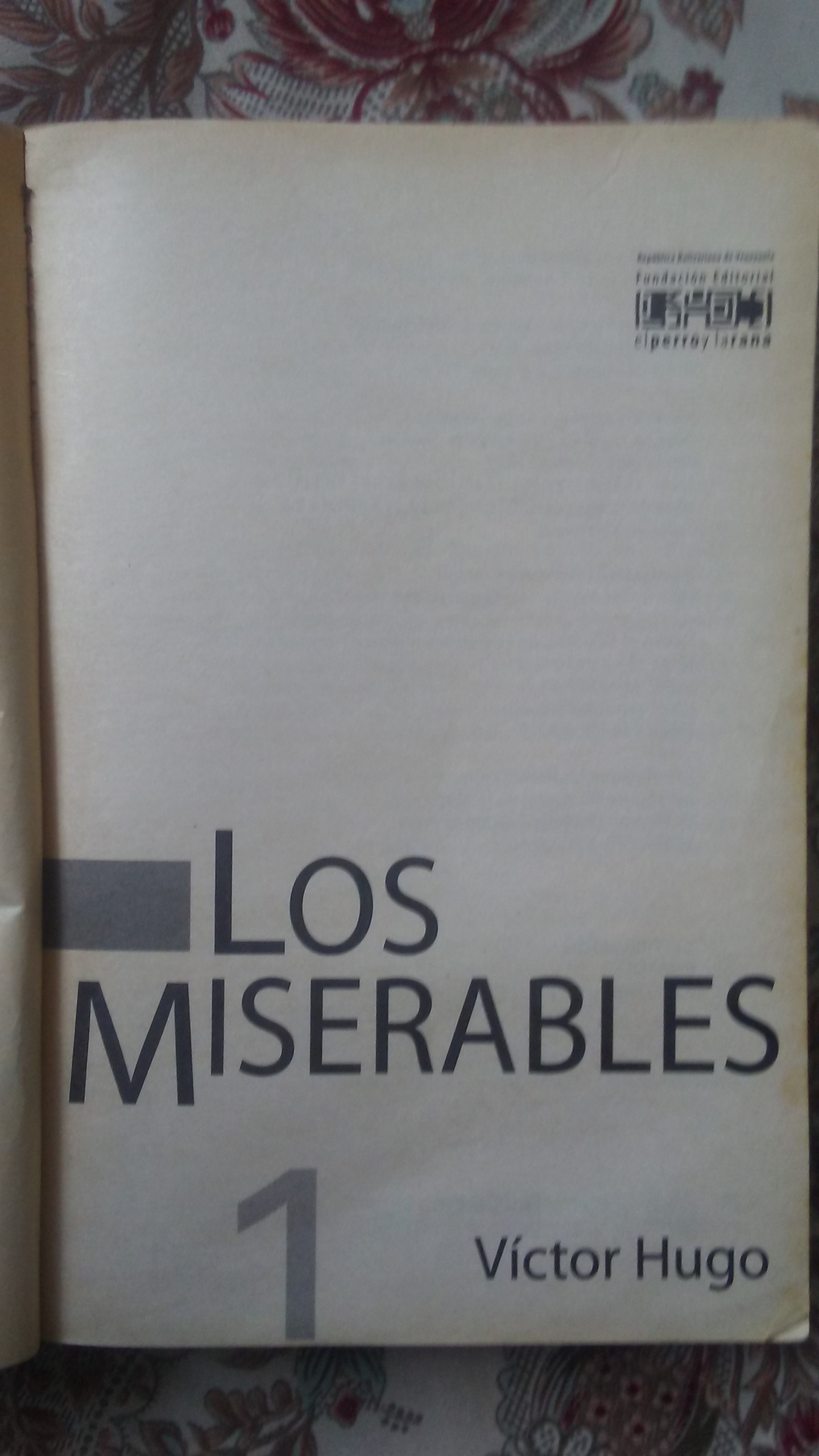
Hello my dear friends, book lovers, today I am going to give you my opinion about one of the most important and well known sagas in the history of France, it is Les Miserables, a story that touched the most sensitive fibres of my heart, I hope you like it.
Hola mis queridos amigos amantes de los libros, el día de hoy les voy a dar mi opinión acerca de una de las sagas más importantes y conocidas de la historia de Francia, se trata de Los Miserables, una historia que tocó las fibras más sensibles de mi corazón, espero les guste.

Author: Víctor Hugo
Year of publication: 1862
Originally the novel was written in ten volumes but I have them compiled in three books that many years ago the government of my country gave to all the inhabitants, in order to promote the habit of reading and to make everyone know these jewels of literature. Due to their age and the amount of reading I have done, the covers are a bit deteriorated, although the inside remains intact (and that is the most important thing).
Originalmente la novela fue escrita en diez tomos pero yo los tengo compilados en tres libros que hace muchos años obsequió el gobierno de mi país a todos los habitantes, en aras de promover el habito de la lectura y lograr que todos conocieran estas joyas de la literatura. Debido a los años que tienen y a lo mucho que los he leído, las portadas están un poco deterioradas, aunque el interior permanece intacto (y es lo más importante)

In the books, we find mostly the story of Jean Valjean, a young working class man who, finding himself without money to feed his family (his sister and nephews) decides to steal a loaf of bread, but is caught and for that alone is condemned to a cold prison where he is treated like dirt, However, when he gets out of prison after serving his sentence, he finds a hermetic society that turns its back on him and rejects him when it realises that he is an ex-convict, he can't get a job, he is not accepted in the inns, it is as if he simply doesn't deserve life.
En los libros nos encontramos mayormente con la historia de Jean Valjean, un joven de clase obrera que al verse sin dinero para alimentar a su familia (su hermana y sobrinos) decide robar una hogaza de pan, pero es atrapado y tan solo por eso es condenado a la fría cárcel donde es tratado como basura, sin embargo, cuando sale de la cárcel luego de cumplir su condena, se encuentra con una sociedad hermética que le da la espalda y lo rechaza al darse cuenta de que es un ex-convicto, no consigue trabajo, no lo aceptan en las posadas, es como si simplemente no mereciera la vida.
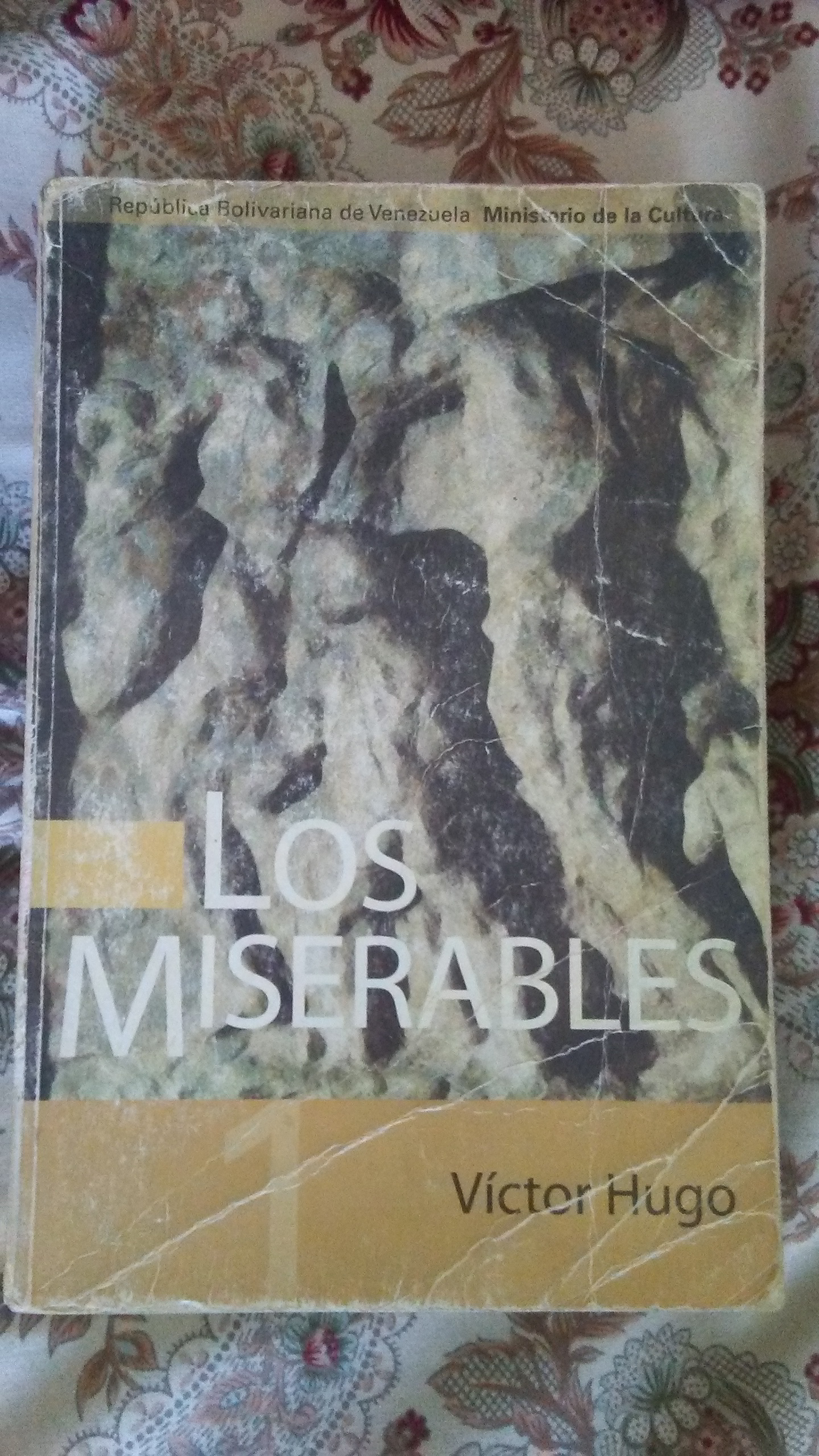
At this point we find something very important and it is the great influence that society exerts on the behaviour of human beings, perhaps it is not decisive, but it is influential, the way they treat you can mark your life forever, and certainly the collective rejection is one of the things that does most damage to the psyche of the human being, And it is what, in my humble opinion, gives this story its title, because it makes you feel miserable, not because you don't have money or an influential surname, but because in the eyes of society, your peers and the environment around you, you are simply worthless.
En este punto nos encontramos algo muy importante y es la gran influencia que ejerce la sociedad en la conducta del ser humano, tal vez no es determinante, pero sí es influyente, la forma en que te tratan puede marcar tu vida para siempre, y ciertamente el rechazo colectivo es una de las cosas que más daño hace a la psique del ser humano, y es lo que, en mi humilde opinión, le da título a esta historia, porque te hace sentir miserable, no es porque no tengas dinero o un apellido influyente, sino porque a los ojos de la sociedad, de tus semejantes y el entorno que te rodea, simplemente no vales nada.
Society still saw Valjean as a thief and denied him the opportunities he needed to vindicate himself, so what choice did he have? He became just that, a thief, so he broke into the monsignor's house to steal, and when he saw himself discovered by the priest, he didn't think twice about attacking him, hitting him over the head before fleeing with the silverware, however he was caught by the police, but, in a gesture Valjean didn't expect at all, and even less so after what he did, the priest tells the police that he was not a thief because the silverware he was carrying was a gift, although when the police leave, he tells him that he can indeed leave with the loot, but that from then on he must invest it in trying to be a different person.
La sociedad seguía viendo a Valjean como un ladrón y le negó las oportunidades que necesitaba para reivindicarse, así que ¿qué otra opción tenía? se convirtió en eso precisamente, en un ladrón, de esta manera entró en la casa del monseñor para robar, y cuando se vio descubierto por el sacerdote, no lo pensó dos veces para atacarlo, golpeándolo en la cabeza antes de huir con la platería, sin embargo fue atrapado por la policía, pero, en un gesto que Valjean no esperaba para nada, y mucho menos después de lo que hizo, el sacerdote le dice a los policías que él no era un ladrón porque esa platería que llevaba era un obsequio, aunque cuando los policías se van, le dice que efectivamente puede marcharse con el botín, pero que a partir de ese momento debe invertirlo en tratar de ser una persona diferente.
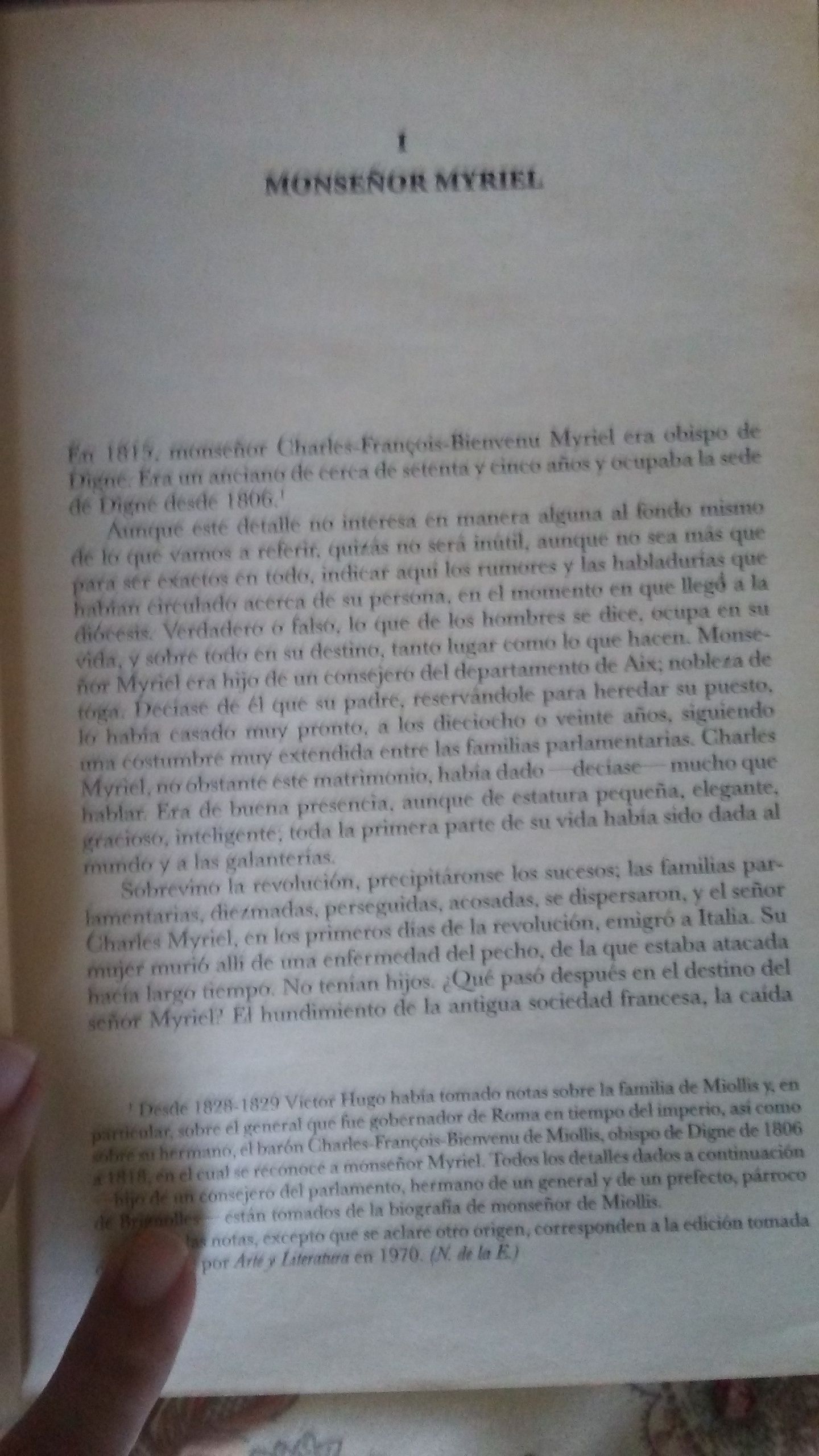
In this way Valjean also knows mercy, forgiveness and a chance, i.e. everything that had been denied to him until now. On the other hand we also know the sad story of Fantine, a beautiful young girl who falls in love with a scoundrel who leaves her pregnant and runs away, therefore, precisely because of the prejudices of society, in order to get a job she decides to leave her little daughter in the care of a couple of innkeepers, The Thénardiers, who had a couple of daughters, and who were supposed to look after the little girl while Fantine sent them money every month for her upkeep, but the wicked couple mistreated the child and relegated her to being their servant, asking Fantine for more and more money.
De esta forma Valjean también conoce la piedad, el perdón y una oportunidad, osea, todo lo que se le había negado hasta ahora. Por otra parte también conocemos la triste historia de Fantine, una hermosa jovencita que se enamora de un canalla que la deja embarazada y huye, por lo tanto, precisamente debido a los prejuicios de la sociedad, para poder conseguir trabajo decide dejar a su hijita al cuidado de una pareja de posaderos, los Thénardier, que tenían un par de hijas, y que supuestamente cuidarían a la pequeña mientras que Fantine les enviaba dinero cada mes para su manutención, pero la malvada pareja maltrataba a la niña y la relegaron a ser su sirvienta, pidiéndole a Fantine cada vez más y más dinero.
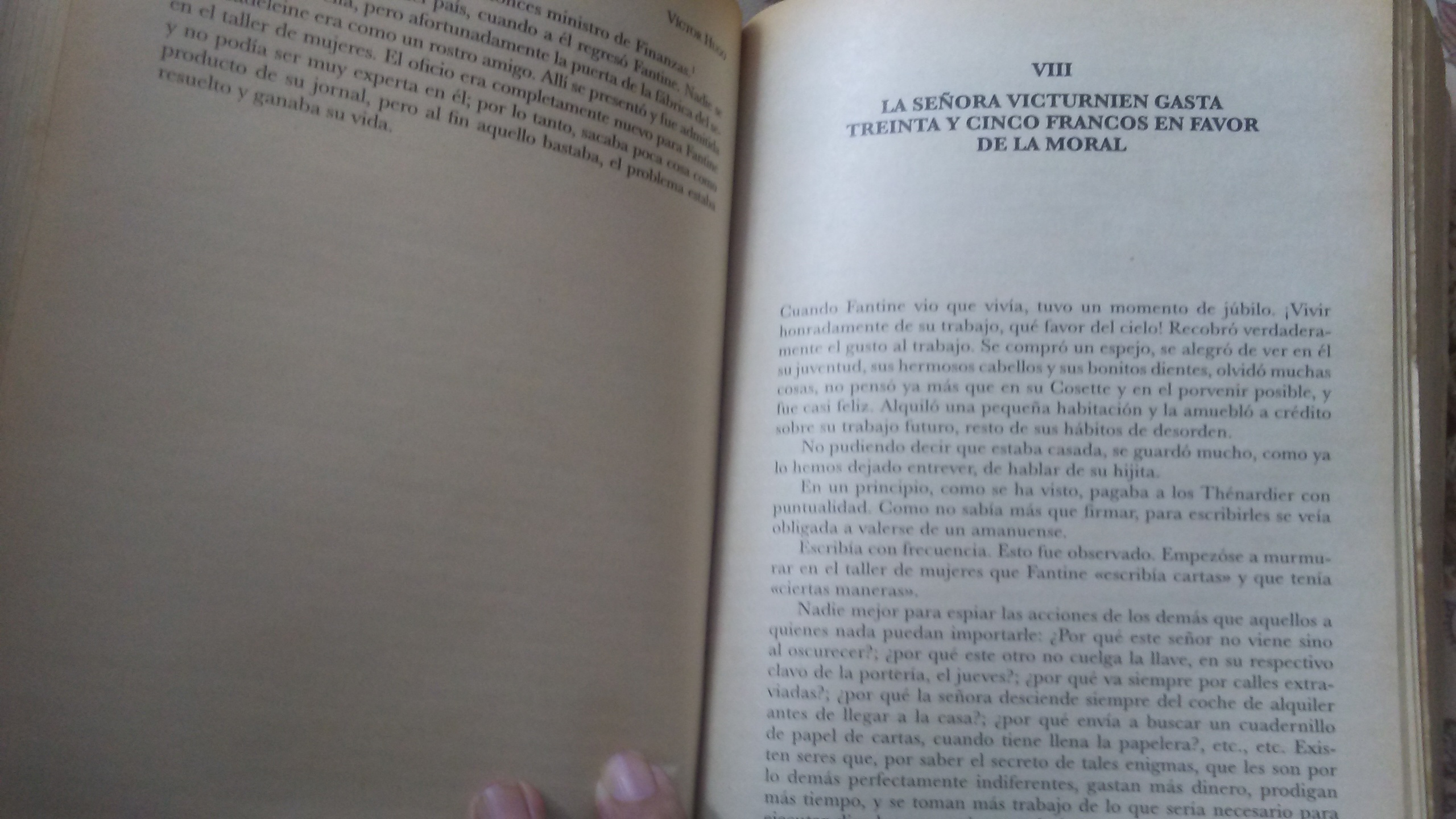
Valjean certainly changed his life and became the mayor of another town and the owner of a brick factory, he also changed his name to Madeleine, by chance Fantine works in that factory and does very well, although one of her colleagues was envious of her. On one occasion a policeman named Javert arrives in town, a man who defines himself as implacable and thirsty for justice, he doesn't believe in redemption, so he despises ex-convicts, prostitutes and other people he considers a bad example for society. So when the ruthless police officer saw Mr. Madeleine, he thought he recognised Valjean and decided to investigate him.
Valjean ciertamente cambió su vida y se convirtió en el alcalde de otra ciudad y el dueño de una fábrica de ladrillos, además cambió su nombre a Madeleine, por azares del destino Fantine trabaja en esa fábrica y le va muy bien, aunque una de sus compañeras le tenía envida. En una ocasión llega a la ciudad un policía llamado Javert, un hombre que se define a sí mismo como implacable y sediento de justicia, no cree en las redenciones, así que desprecia a los ex-presidiarios, prostitutas y demás personas que considera un mal ejemplo para la sociedad. Así que cuando el implacable oficial de policía vio al señor Madeleine, le pareció reconocer a Valjean y decidió investigarlo.
To make matters worse, Fantine was fired by the manager of the brick factory and had to sell her belongings, her hair and even her teeth in order to send money for her daughter Cosette, until she finally ended up selling her body as a prostitute and earning the hatred of Javert who wanted to put her in jail after a street fight, Monsieur Madeleine defended her and after Fantine died he decided to go and look for the girl at the Thénardier's house and at the same time flee from Javert who insisted on hunting him down like an animal.
Para colmo Fantine fue despedida por la encargada de la fábrica de ladrillos y se vio en la necesidad de vender sus pertenencias, su cabello y hasta sus dientes para poder enviar dinero para su hija Cosette, hasta que finalmente terminó vendiendo su cuerpo como prostituta y ganándose el odio de Javert que pretendía meterla en la cárcel tras una pelea callejera, el señor Madeleine la defendió y luego de que Fantine murió él decidió ir a buscar a la niña en casa de los Thénardier y al mismo tiempo huir de Javert que insistía en cazarlo como si de un animal se tratase.

Then began the great chase for Madeleine, who in the eyes of the implacable Javert had never ceased to be Valjean, that is to say, a common thief. This is how his life went on, fleeing from one place to another, finally taking refuge in a convent and a school for young ladies where he found work as a gardener while Cosette had the opportunity to study there and later they continued to flee from Javert's siege and then from Marius, a young man who ended up falling in love with Cosette when he saw her walking with her "father" (Valjean) in the square. Valjean did not want his daughter to fall in love and leave him because for him she was the only thing he had, the only being who lavished him with affection and sincere gratitude, his only connection to the sensible part of life.
Entonces comenzó la gran persecución para Madeleine que a los ojos del implacable Javert jamás había dejado de ser Valjean, es decir, un vulgar ladrón. Así transcurrió su vida, huyendo de un lugar a otro, refugiándose finalmente en un convento y escuela de señoritas donde encontró trabajo como jardinero mientras Cosette tuvo la oportunidad de estudiar allí y posteriormente siguieron huyendo del asedio de Javert y luego de Marius, un joven que terminó enamorándose de Cosette cuando la vio pasear con su "padre" (Valjean) en la plaza. Valjean no quería que su hija se enamorara y lo dejara porque para él era lo único que tenía, el único ser que le prodigaba cariño y agradecimiento sincero, su única conexión con la parte sensible de la vida.
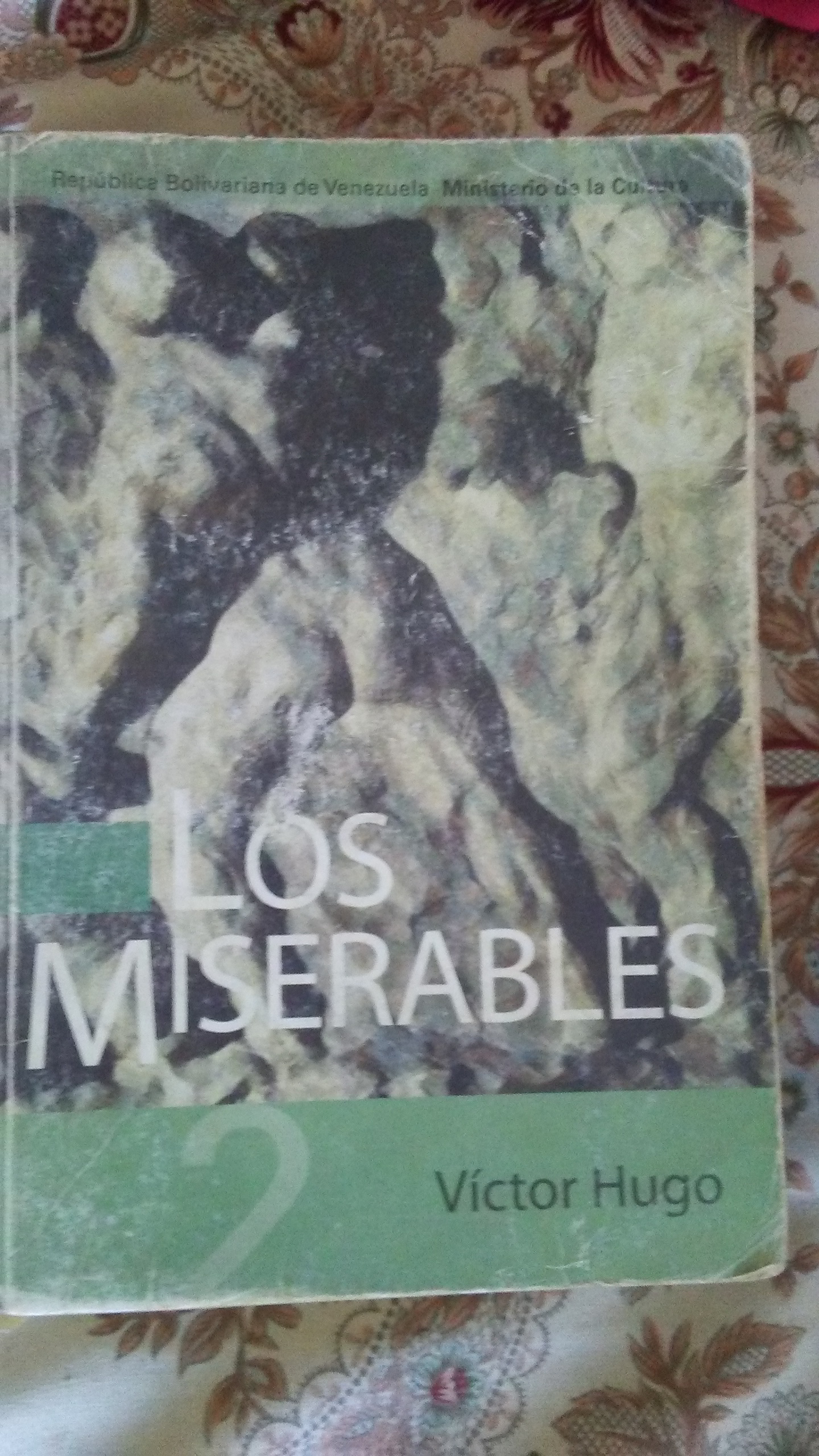
Throughout the novel we are shown a bleak picture of the underprivileged in society, demonstrating the huge gap between the rich and the poor: prejudice, few opportunities for education and work, social rejection, in short, everything that eventually leads to collective discontent which in turn leads to mass insubordination of the working class, which was not uncommon in French society which had already had a great revolution where the monarchy was abolished.
Durante toda la novela se nos muestra un panorama desolador para los menos favorecidos de la sociedad, demostrando además la enorme brecha que había entre los ricos y los pobres: los prejuicios, las pocas oportunidades de educación y trabajo, el rechazo social, en fin, todo lo que finalmente conduce a un descontento colectivo que a su vez conlleva a una insubordinación en masa de la clase obrera, algo que no resultaba raro en la sociedad francesa que ya había tenido una gran revolución donde abolieron la monarquia.
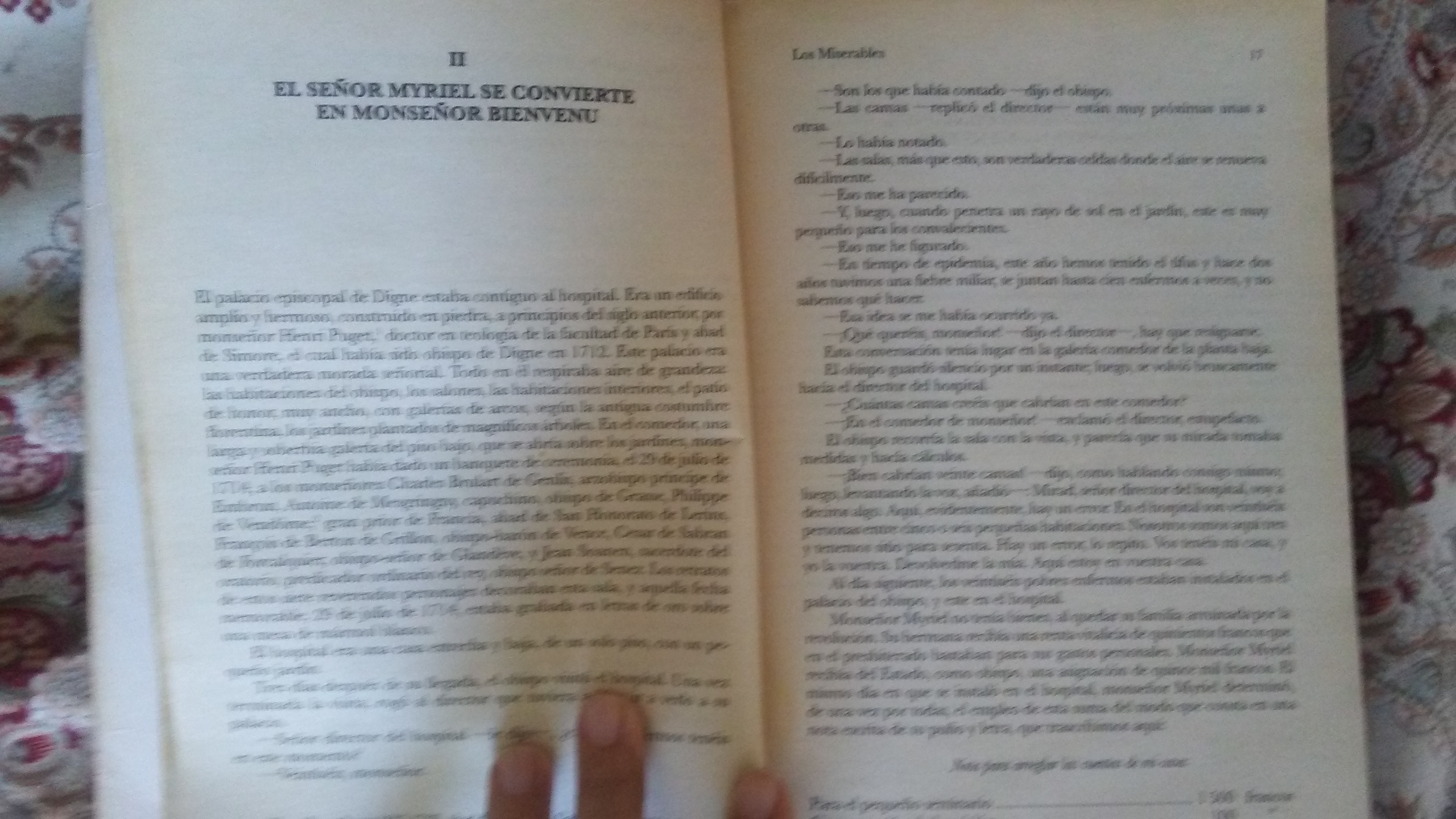
The author, Victor Hugo, presents us in his work with a great criticism of hypocritical society and above all of monarchies, even in one paragraph he refers to it as "the scourge of Europe" as it promotes classism, and also criticises the cloister of monasteries and convents for stifling people's thoughts, ideals and feelings in perpetual vows, closing their minds and forcing them to think in only one way, This is also true of feudalism, which forced its vassals to serve without objections or conditions; in fact, this is evident in the attitude of Javert, whose upbringing and society led him to be implacable even with himself, for when he let Valjean go free in gratitude for having saved his life, he ended up committing suicide because he could not bear the thought of having gone against his nature by letting a criminal go free.
El autor, Víctor Hugo, nos presenta en su obra una gran crítica a la sociedad hipócrita y sobre todo a las monarquías, incluso en un párrafo se refiere a ella como "el azote de Europa" ya que promueve el clasismo, y asimismo critica el claustro de los monasterios y conventos por ahogar en los votos perpetuos los pensamientos, ideales y sentimientos de las personas, cerrando sus mentes y obligándolas a pensar de una sola manera, lo que también sucede con el feudalismo que obligaba a sus vasallos a servir sin objeciones ni condiciones, de hecho esto se evidencia en la actitud de Javert a quien su educación y la sociedad llevó a ser implacable hasta con él mismo, ya que cuando dejó libre a Valjean en agradecimiento porque él le salvó la vida, terminó suicidándose al no poder soportar la idea de haber ido contra su naturaleza dejando ir a un criminal.
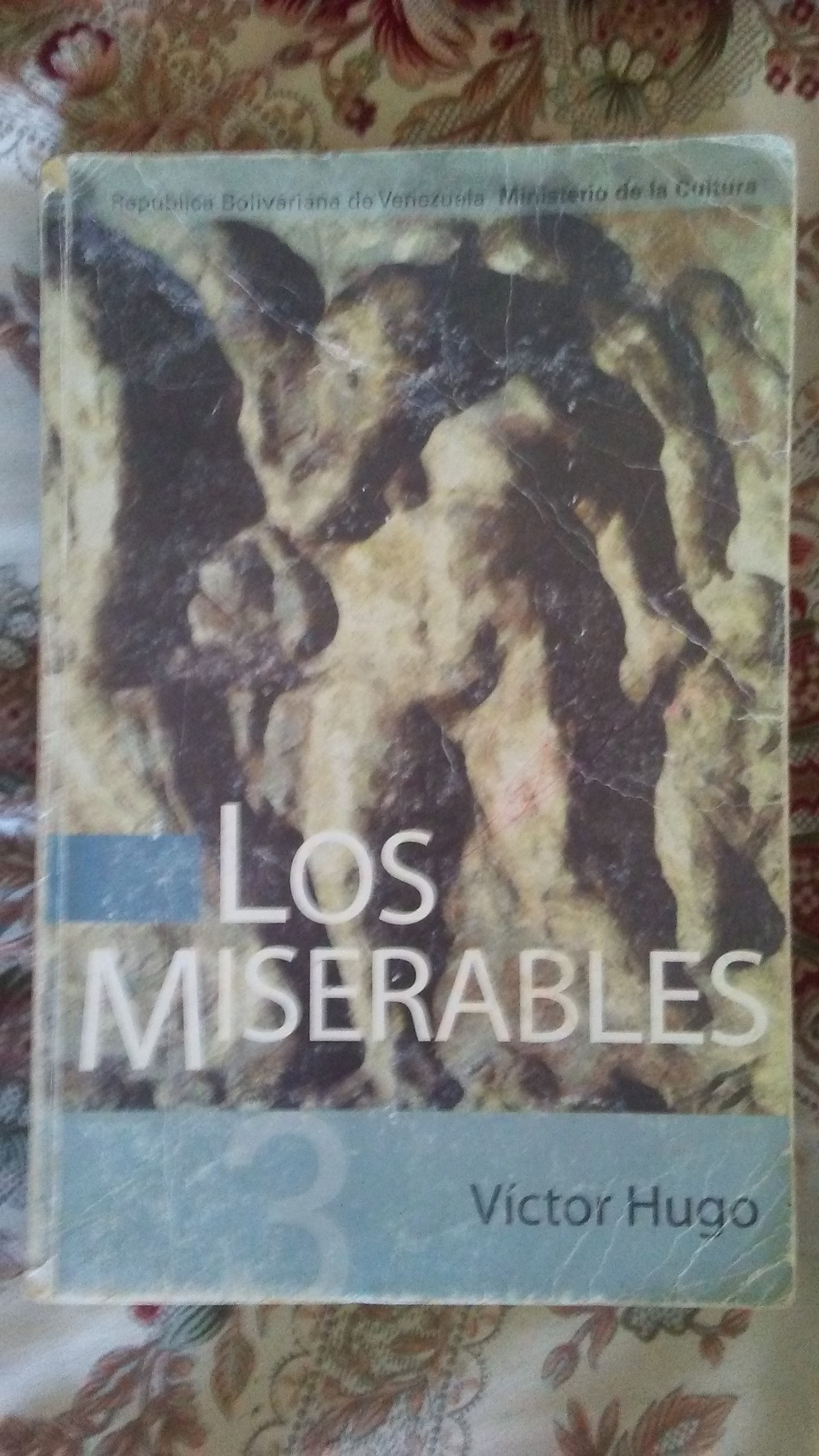
Les Miserables is not a book for all audiences because if you are an impatient reader, who only wants to know about the history of the main characters, you might find this novel boring and even slow, as the author does not only focus on the characters, but he talks about history and mentions important characters and events such as Napoleon Bonaparte or the battle of Waterloo. I think it is very important to give context to the story and above all to help us understand the ideals of the French citizens, and how non-conformity gradually leads to insubordination.
Los Miserables no es un libro para todas las audiencias ya que si eres un lector impaciente, que quiere saber únicamente acerca de la historia de los personajes principales, esta novela podría resultarte aburrida y hasta lenta, ya que el autor no se centra únicamente en los personajes, sino que habla de historia y nos menciona personajes y hechos importantes como Napoleón Bonaparte o la batalla de Waterloo. Yo considero que es de suma importancia para darle contexto a la historia y sobre todo para ayudarnos a entender los ideales de los ciudadanos franceses, y como es que paulatinamente la inconformidad da pie a la insubordinación.

Before I say goodbye, friends, I would like to highly recommend this novel to lovers of historical drama but also to those who love justice and defend its ideals. This story is not only about prejudice and hypocrisy, we also find pity and understanding in characters like Monsignor Myriel who in spite of everything saw in Valjean a good person, and also in Éponine (one of the Thénardier's daughters) who finally gives the address of Cosette to Marius, even though she was also in love with him, she did it because in her soul there was at least a hint of goodness.
Antes de despedirme, amigos me gustaría recomendarles altamente esta novela a los amantes del drama histórico pero también a los que aman la justicia y defienden sus ideales. Esta historia no solo es acerca de prejuicios e hipocrecía, también encontramos la piedad y la comprensión en personajes como Monseñor Myriel que a pesar de todo vio en Valjean a una buena persona, y también en Éponine (una de las hijas de los Thénardier) que finalmente le da la dirección de Cosette a Marius, a pesar de que ella también estaba enamorada de él, lo hizo porque en su alma había al menos un ápice de bondad.
Thank you very much for all your attention, friends, see you another time.
Muchas gracias por toda su atención, amigos, nos leemos en otra oportunidad.

Imagen diseñada por mi en el editor de Canva
All images in this post are my own, taken with my LGK4 Lite mobile phone.
Todas las imágenes de este post son de mi propiedad, las tomé con mi teléfono celular LGK4 Lite
¡Felicitaciones!
Estás participando para optar a la mención especial que se efectuará el domingo 17 de julio del 2022 a las 8:00 pm (hora de Venezuela), gracias a la cual el autor del artículo seleccionado recibirá la cantidad de 1 HIVE transferida a su cuenta.
¡También has recibido 1 ENTROKEN! El token del PROYECTO ENTROPÍA impulsado por la plataforma Steem-Engine.
1. Invierte en el PROYECTO ENTROPÍA y recibe ganancias semanalmente. Entra aquí para más información.
2. Contáctanos en Discord: https://discord.gg/hkCjFeb
3. Suscríbete a nuestra COMUNIDADEntra aquí para más información sobre nuestro trail. y apoya al trail de @Entropia y así podrás ganar recompensas de curación de forma automática.
4. Visita nuestro canal de Youtube.
Atentamente
El equipo de curación del PROYECTO ENTROPÍA
Muchísimas gracias por su apoyo